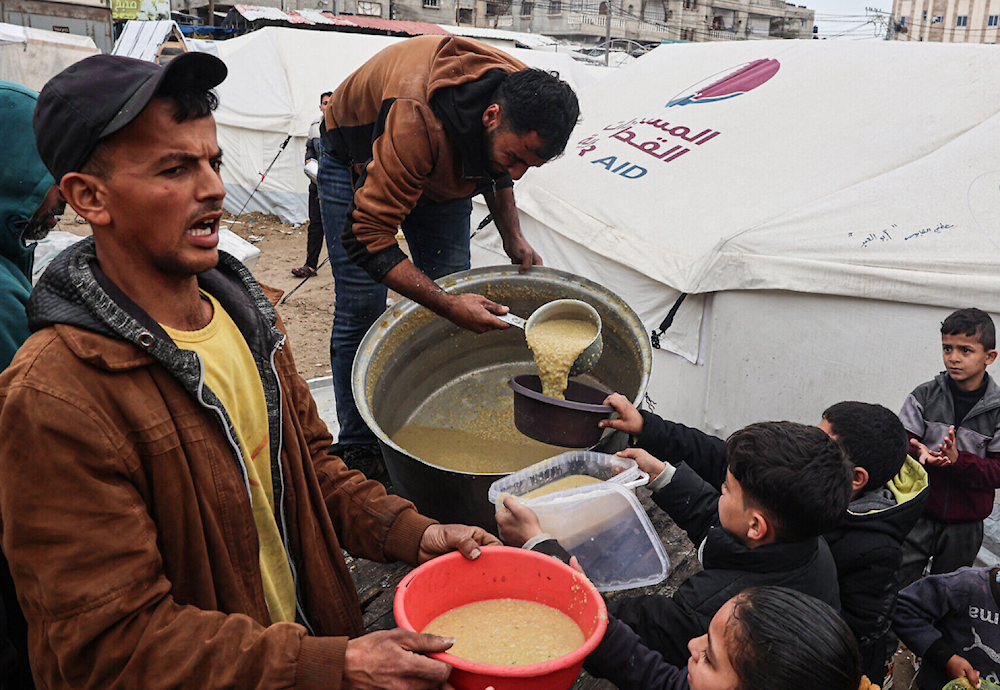68% of Israeli settlers oppose humanitarian aid to Gaza: Poll
According to the opinion survey, the statistics are considerably worse among far-right Israelis, with the opposition accounting for 80% and four out of five.
-

Volunteers distribute rations of soup to displaced Palestinians in Rafah in the southern Gaza Strip on February 18, 2024. (AFP)
According to a new opinion survey, the majority of Israeli settlers reject transferring humanitarian supplies to Palestinians in the besieged Gaza Strip, where the occupation has continued its ongoing war for 142 days.
The Ministry of Health in Gaza announced in its daily death toll that the number of martyrs has reached 29,606, in addition to 69,737 injuries.
According to a study done by the "Israel Democracy Institute, more than two out of every three Israeli settlers, or 68% of respondents, oppose "the transfer of humanitarian aid to Gaza residents at this time."
According to the opinion survey, the statistics are considerably worse among far-right Israelis, with the opposition accounting for 80% and four out of five.
The findings of the Israeli poll came as the United Nations Food and Agriculture Organization (FAO) reported in a recent report that 550,000 people in Gaza are now experiencing "catastrophic" food insecurity.
FAO Deputy Director-General Beth Bechdol emphasized that all 2.2 million people in Gaza are in the top three hunger categories, from level three, which is considered an emergency, to level five, or catastrophe, saying, "We are seeing more and more people essentially on the brink of and moving into famine-like conditions every day."
UN special rapporteurs also warned that one in every four people in Gaza is malnourished, and nine out of ten households in some regions go hungry every day and night.
The UN's Food and Agriculture Organization (FAO) stated that the Gaza Strip's population is experiencing "unprecedented levels of near famine-like conditions" due to the prolonged Israeli aggression on Gaza.
Many humanitarian groups, including UNRWA, have been forced to suspend operations in the Gaza Strip since October 7, 2023, leaving hundreds of thousands of Palestinians without access to help.
MSF, Amnesty, others accuse 'Israel' of impeding aid delivery in Gaza
At a press briefing by Doctors Without Borders (MSF), Refugees International, Oxfam, Amnesty International, and other groups, Avril Benoit, executive director of MSF-USA, told reporters that a potential invasion of the city of Rafah could transform the southern Gaza City into a "graveyard" and exacerbate the imminent risk of famine.
"The consequences of a full-scale assault on Rafah are truly unimaginable," Benoit told reporters. "Carrying out a military offensive there would turn it into a graveyard."
The city of Rafah, which currently houses 1.4 million Palestinians in tent camps and shelters, is the "end of the line," Benoit said.
"It's the last hub of healthcare services and humanitarian assistance for the people in Gaza," she said. "Attacking Rafah effectively means cutting off the lifelines of people who have already lost everything except their lives."
Jeremy Konyndyk, president of Refugees International, stated that due to Israeli strikes, it has become "virtually impossible" for humanitarian organizations to operate safely within Gaza, thereby increasing the risk of famine.
"People, mostly at this point in the north, are already right on the brink of famine," Konyndyk said. "The risk here, if there is not a meaningful humanitarian operation allowed to operate in an unfettered way at scale throughout Gaza, is famine."
"And that famine will occur not because of any natural phenomenon but simply because of the manner in which this war is being conducted and the persistent and intentional denials of humanitarian access principally by the Israeli government."
Konyndyk also highlighted that the idea of safely evacuating the population of Rafah is a "mirage," as there are no other safe destinations available for them.

 4 Min Read
4 Min Read








